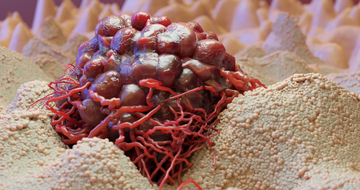
Corresponding FDA Drug Update: FDA grants accelerated approval to epcoritamab-bysp for relapsed or refractory diffuse large B-cell lymphoma and high-grade B-cell lymphoma
What is the potential role for epcoritamab-bysp in the treatment of diffuse large B-cell lymphoma?
- Epcoritamab-bysp is a bispecific T-cell engaging antibody that targets CD20 and CD3, activates T-cell release of pro-inflammatory cytokines, and induces B-cell lysis. Epcoritamab-bysp binds to the CD3 receptor expressed on the surface of T-cells and CD20 expressed on the surface of lymphoma cells and healthy B-lineage cells 2.
- Approval for this indication was based on the EPCORE NHL-1 trial, an open label, multi-cohort, multicenter, single arm trial in patients with refractory and relapsed B-cell lymphoma 1.
- In the expansion cohort of the EPCORE NHL-1 trial, 148 patients who were 18 years of age or older with CD20+ relapsed or refractory DLBCL not otherwise specified (NOS), were enrolled, including DLBCL arising from indolent lymphoma, and high-grade B-cell lymphoma after two or more lines of systemic therapy, including at least one anti-CD20 monoclonal antibody-containing therapy3.
- Participants received epcoritamab-bysp by subcutaneous injection in 28 days cycles via the labeled dose including step-up dosing in Cycle 1 (0.16 mg on Day 1, 0.8 mg on Day 8, and 48 mg on Day 15 and Day 22) followed by fixed dosing of 48 mg weekly dosing during Cycles 2 through 3, every other week during Cycle 4 through 9, and then every four weeks on Day 1 of subsequent cycles 2,3.
- The primary endpoint of overall response rate (ORR) was 61% (95% CI: 53, 69) with 38% of patients achieving complete responses. After a median follow-up of 9.8 months among responders, the estimated median duration of response (DOR) was 15.6 months (95%CI: 9.7, not reached)3.
- The most common adverse effects occurring in more than 20% of participants, were CRS, fatigue, musculoskeletal pain, injection site reactions, pyrexia, abdominal pain, nausea, and diarrhea 3.
- The most common grade 3 to 4 laboratory abnormalities were decreased neutrophil count, decreased lymphocyte count, decreased hemoglobin, white blood cell count, and decreased platelets 3,4.
- The National Comprehensive Cancer network (NCCN) recommends epcoritamab-bysp, as a third line agent for DLBCL, after at least two lines of systemic therapy; including patients with disease progression after transplant or CAR T-cell therapy. Alternative therapies for third line DLBCL include anti-CD19 CAR T-cell therapies; tisagenlecleucel, lisocabtagene maraleucel, axicabtagene ciloleucel, bispecific T-cell therapy; glofitamab-gxbm, and non T-cell therapies; loncastuximab tesirine-lpyl, and selinexor5.
What role can the pharmacist play in the management of patients on Epcoritamab-bysp?
- Pharmacists are crucial in the selection of therapies for patients and can help identify appropriate candidates for epcoritamab-bysp therapy.
- Due to the risk of cytokine release syndrome (CRS), immune effector cell-associated neurotoxicity syndrome (ICANS) and neurologic problems patients receiving epcoritamab-bysp should be hospitalized for 24 hours on day 15 of cycle 1 dosage of 48mg 1.
- Pharmacists can help educate patients, monitor, and manage immune related adverse events with epcoritamab-bysp, including CRS, muscle and bone pain, pyrexia, cytopenia, abdominal pain, and injection site reactions.
Clinical pearls
- Epcoritamab-bysp has a black box warning for CRS and ICANS.
- To prevent CRS, all patients require pretreatment with dexamethasone, diphenhydramine, and acetaminophen prior to each dose in cycle 1, as well as posttreatment with dexamethasone for 3 days following each dose in cycle 1.
- Steroid pre/post treatment should be continued in cycle 2 and beyond until patient has tolerated epcoritamab-bysp without grade 2 or higher CRS 2.
- Consider infection prophylaxis for pneumocystis jiroveccii pneumonia and herpes zoster before initiating epcoritamab-bysp 2.
- Dose modifications are recommended for:
- Infections: hold until active infection is resolved, consider permanently discontinuing for grade 4 infections
- Absolute neutrophil count (ANC) < 0.5 x 109/L: hold until ANC > 0.5 x 109/L
- Platelet count < 50 x 109/L: hold until platelet count is 50 x 109/L or greater
- Other grade 3 or higher adverse reactions: hold until resolved to grade 1 or baseline 2
- Financial and co-payment assistance is available for eligible patients through MyNavCare, for commercially insured patients through the Genmab Patient Assistance Program, available at Epkinly Financial Support 6.
References
1.FDA grants accelerated approval to epcoritamab for relapsed or refractory diffuse large B-cell lymphoma and high grade B-cell lymphoma. https://www.fda.gov/drugs/drug-approvals-and-databases/fda-grants-accelerated-approval-epcoritamab-bysp-relapsed-or-refractory-diffuse-large-b-cell. Accessed October 9, 2023
2.Epcoritamab-bysp (Epkinly) [prescribing information]. Plainsboro, NJ: Genmab US Inc; May 2023.
3.Thieblemont C, Phillips T, Ghesquieres H, et al. Epcoritamab, a Novel, Subcutaneous CD3xCD20 Bispecific T-Cell-Engaging Antibody, in Relapsed or Refractory Large B-Cell Lymphoma: Dose Expansion in a Phase I/II Trial. J Clin Oncol. 2023 Apr 20;41(12):2238-2247. doi: 10.1200/JCO.22.01725.
4.Hutchings M, Mous R, Clausen MR, et al. Dose escalation of subcutaneous epcoritamab in patients with relapsed or refractory B-cell non-Hodgkin lymphoma: an open-label, phase 1/2 study. Lancet. 2021 Sep 25;398(10306):1157-1169. doi: 10.1016/S0140-6736(21)00889-8.
5.National Comprehensive Cancer Network. B-cell Lymphoma (Version 5.2023). https://www.nccn.org/professionals/physician_gls/pdf/b-cell.pdf . Accessed Oct 5, 2023.
6.MyNavCare Financial Assistance Resources. Accessed November 13, 2023. https://www.epkinly.com/support


